
Compilation Album
95 Million People's Popular Request Vol.3 (OP-7420)
(Update: 21th. November 2024)



| TITLE | 95 Million
People's Popular Request Vol.3 |
||||
| CATALOG NUMBER | OP-7420 |
||||
| RELEASE DATE | 15th November. 1965 / First Press | ||||
| TRACK LISTING | SIDE 1 | SIDE 2 | |||
| Help! (The
Beatles) |
You're Going
To Lose That Girl (The Beatles) |
||||
| Angel (Cliff
Richard) |
The Cruel Sea
(The Dakotas) |
||||
| La Playa (Claude
Ciari) |
We've Gotta Get
Out Of This Place (The Animals) |
||||
| Catch Us If You Can (The Dave Clark Five) |
Il Silenzio (Georges Jouvin Et Sa Trompette
D'Or) |
||||
| Poupée De Cire, Poupée De Son (Franck Pourcel
Et Son Grand Orchestre) |
Legata Ad Un Granello Di Sabbia (Cliff
Richard) |
||||
| I'm Henry The Eighth I Am (Herman's Hermits) |
Quand Les Roses (Adamo) |
||||
| La Nuit (Adamo) |
L'Amour, C'Est Pour Rien (Enrico Macias) | ||||
| Yesterday (The Beatles) | |||||
| FRONT --> Click! | BACK --> Click! | SIDE 1 --> Click! | SIDE 2 --> Click! | DISK --> Click! | |
 |
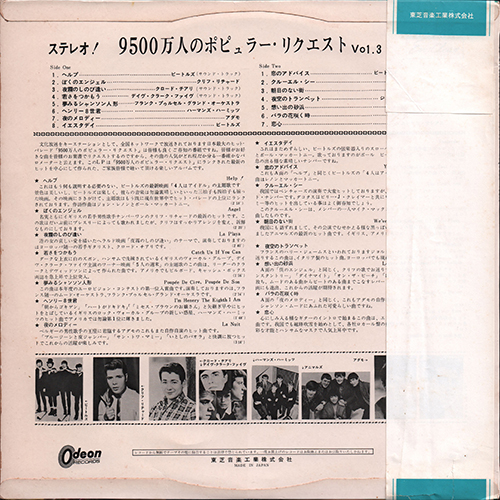 |
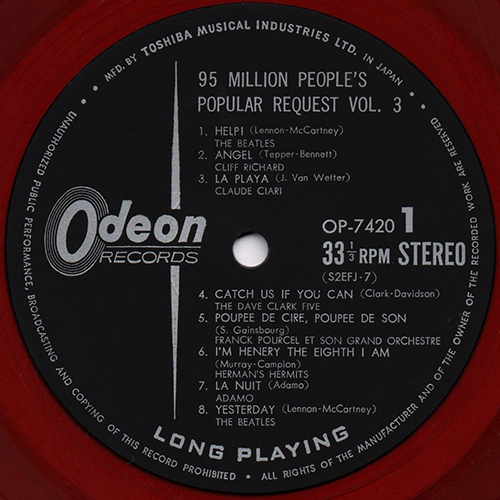 |
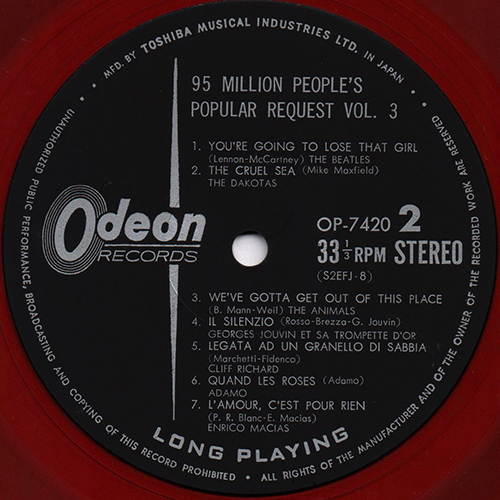 |
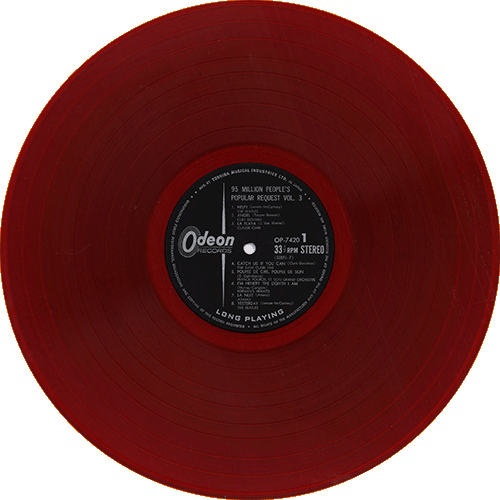 |
|
| INNER SLEEVE |
LYRIC SHEET (Slip Sheet Type) |
||||
| FRONT --> Click! | BACK --> Click! | The original plain white inner bag has a
fold-over flap at the top of the bag to prevent the record
from falling out. |
FRONT --> Click! | BACK --> Click! | |
 |
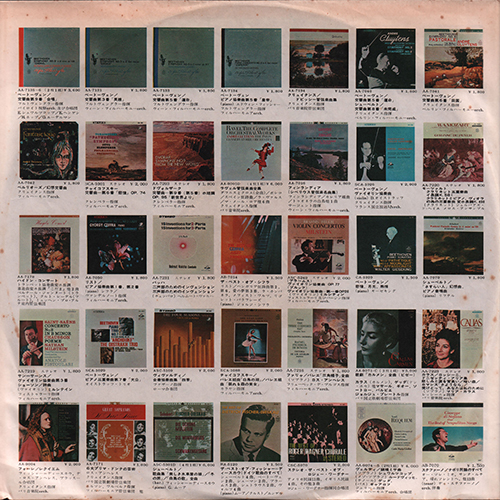 |
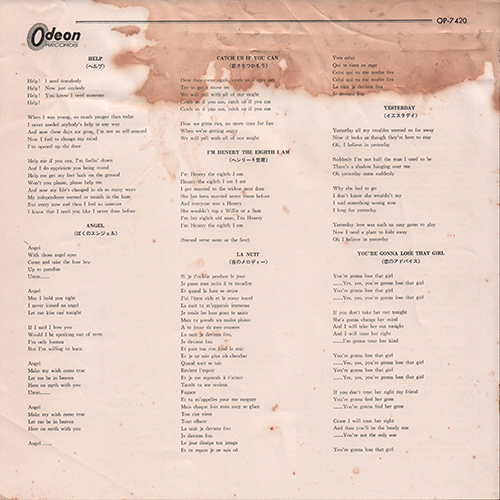 |
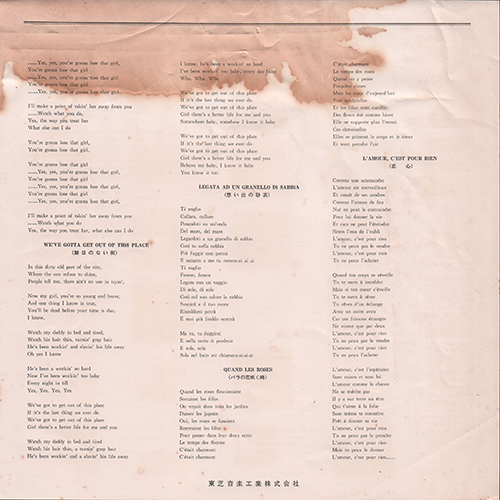 |
||
| INNER SLEEVE CLOSE UP |
LYRIC SHEET CLOSE UP | ||||
 |
The original colour "advert" inner bag. Has a fold-over flap at the top of the bag to prevent the record from falling out. The words "Special Selection Records" was printed in black |
 |
Odeon logomark was printed on the lyric
sheet. |
||
| LYRIC
SHEET CLOSE UP |
|||||
 |
 |
Catalog number
"OP-7420" and "Toshiba Musical Industries Ltd." were printed
on the lyric sheet. |
|||
| FRONT COVER CLOSE UP | |||||
 |
 |
Odeon logo mark and catalog No. were printed on the front cover. |  |
The album title, "95 Million Peoples
Popular Request Vol.3" is hidden on the back of the obi. |
|
| BACK COVER CLOSE UP | |||||
 |
This record contains two songs "Help! / Yesterday (side-1)" and "You're Going To Lose That Girl (Side-2)" performanced by The Beatles. | ||||
| BACK COVER CLOSE UP | |||||
 |
 |
 |
 |
||
| Single type. Full laminated soft cover. Twin-flipback cover (round type). "Toshiba Musical Industries Ltd." was printed at the bottom of the back cover. Odeon logo mark was printed at the lower left corner of the back sleeve. | "G ¥1,800" was printed at the bottom of the back cover. | Toshiba pressed a lot of
their records on red, “Everclean” vinyl. |
|||
| LIGHT
BLUE OBI: CLOSE UP |
|||||
 |
 |
It is light blue / white in design with
light blue background with the half circle on top. It also features an Odeon logo and "STEREO" information. |
 |
catalog number "OP-7420" and price "¥ 1,800" were printed on the bottom. | |
 |
There is no order sheet on the
back side of the Obi. "Toshiba Musical Industries Ltd." was printed on the strip. |
||||
| LABEL CLOSE UP | |||||
 |
 |
Toshiba
pressed a lot of their records on red, "Everclean" vinyl
from 1958 through 1974 (maybe). The Everclean vinyl
was designed to be less prone to collecting static
electricity and dust than the more common black vinyl. The
words "MFD. BY TOSHIBA MUSICAL INDUSTRIES LTD. IN JAPAN" was
printed at the perimeter. |
|||
| LABEL CLOSE UP |
|||||
 |
 |
 |
Catalog number and matrix
number were printed at the right side of the center hole. The words "LONG PLAYING" was printed at the bottom of the label. |
||
| LABEL CLOSE UP | |||||
| SIDE 1 |
SIDE 2 |
This record contains two songs "Help! / Yesterday (side-1)" and "You're Going To Lose That Girl (Side-2)" performanced by The Beatles. | |||
 |
 |
||||
|
OTHER ITEM
|
|||||
| - |
|||||
| RECORD LABEL | Odeon Label Type-1 (with the words "LONG PLAYING") | ||||
| MIX | STEREO |
||||
| MATRIX No. | SIDE 1 | S2EFJ-7 4 |
|||
| SIDE 2 | S2EFJ-8 7 | ||||
| PRESS MARK |
K5
L5 |
||||
| VINYL COLOR | RED | ||||
| RECORD COMPANY'S NAME | SLEEVE |
Toshiba Ongaku
kogyo Kabusikigaisha |
|||
| LABEL |
MFD. BY TOSHIBA MUSICAL INDUSTRIES
LTD. IN JAPAN |
||||
| SYMBOL/PRICE | G ¥1,800 |
||||
| LYRIC SHEET STYLE | Slip Sheet Type |
||||
| COVER FORM | Single type. Full laminated soft cover. Twin-flipback cover (round type) |
||||
| INNER SLEEVE |
The original colour "advert" inner bag
Type-3 |
||||
| OBI | Light
Blue Obi / without Order sheet |
||||
| COVER DESIGN/ PHOTO/ NOTES | - |
||||
|
COMMENTS
|
Black Odeon label with
silver print. The words "LONG PLAYING" was printed at the bottom of the label. "95 Million Popular Requests" was a radio program broadcasting a hit parade throughout Japan. This program began broadcasting in April 1963, and is hosted by Masao Kojima. With "Nippon Cultural Broadcasting Inc." in Tokyo as a key station, it has a network of 34 private broadcasters from Hokkaido to Okinawa, for a total of 111 stations. This record contains two songs "Help! / Yesterday (side-1)" and "You're Going To Lose That Girl (Side-2)" performanced by The Beatles. Red vinyl: Besides good sound and quality printing, Japanese records also offered some other things of interest to the collector. One of the primary manufacturing companies in Japan, Toshiba, pressed a lot of their records on red, “Everclean” vinyl from 1958 through 1974 (maybe). While not pressed as collectors’ items, these red vinyl pressings are more sought out by collectors than their black vinyl counterparts. The Everclean vinyl was designed to be less prone to collecting static electricity and dust than the more common black vinyl. The obi: "Light blue" Obi It is light blue / white in design with light blue background with the half circle on top. It also features an Odeon logo, catalogue number and price information. While most Japanese records feature local music, a lot of music fans there like foreign music, as well. The language barrier in Japan presented a problem – should foreign album covers be changed for Japanese albums? The solution was the obi, which means “belt” or “sash”. The obi is a strip of paper, usually about two inches wide, that wraps vertically around the album cover, containing information about the artist and album in Japanese. As these strips of paper were fragile and easily torn, they are often missing, especially since consumers in the 1950s and 1960s attached little significance to them. Finding Japanese records made prior to 1970 that still have the obi intact can be quite difficult, and for some albums, nearly impossible. The inclusion of the obi can dramatically affect the price of some Japanese records, sometimes increasing the price by a factor of ten. |
||||
